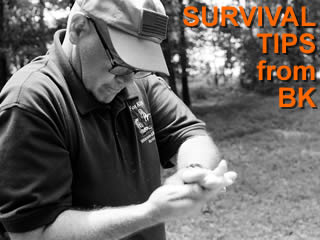Survival Tips from BK

I am often asked to pick the top survival priority from a list.
Survival priorities change based on the
environment, physical conditioning, health and resources (among other
things.)
In extreme environments such as cold climates and deserts,
shelter is actually often higher on the list than water. This is true,
of course, if you start out hydrated and are not injured or ill. Exposure
in extreme temperature conditions can kill quicker than dehydration, often
within hours and sometimes within minutes (such as in a "man overboard"
survival situation). In cold climates the big enemy is hypothermia (lowering
of the body core temperature) and in the desert it is hyperthermia (raising
of the body core temperature.) The sun promotes dehydration and burns
the skin causing injuries that speed dehydration and are extremely painful
- the trick in this environment is to conserve sweat by use of shelter.
In temperate climates or mild conditions water is often
the higher priority because the body is able to maintain temperature with
little or no protection. In a no work situation one can go about three
days without water but that is in a degraded state. Water is often overlooked
as a priority in cold climates but your body consumes water in the metabolic
process and actually dehydrates by just shivering. In most situations,
other than extreme environments, water will be the highest priority.
Unless you are diabetic, food will never be a higher
priority than water or shelter. A healthy human being can go about three
weeks without food if necessary. This is an extreme statement but - once
you get over the hunger pains and the idea of not eating your body can
still function fairly well for some time if you are healthy and strong.
It will begin to "consume itself" in an effort to maintain energy
levels for vital organs. This is the point where fat and muscle are depleted
(you know - starvation diets). The biggest problem occurs when the digestive
system and other internal organs begin to "shut-down". The body
is a marvelous creation and it will shut down systems that aren't being
used - especially when resources are low. What this creates is similar
to a "pickle" in baseball. You can't just eat whatever you find
and expect your body to turn everything back on and have it work right.
You need medical help in that process to do it gradually without damaging
anything. Your best bet is to nibble. Eat very light on a regular schedule
based on the availability of food but... NEVER eat without water. The
goal here should be to eat something every other day if you can but if
you go four or five days you don't need to freak out... just find some
food and don't be real picky. :) In long term survival situations ample
food sources must be found.
Medical is only a priority when there is an injury
or illness and then it often jumps right to the top of the list - do not
pass go, do not collect $200. The reason this is so is because in a survival
situation there is no hospital - no doctor. Even the smallest injury like
a foot that is cut crossing a creek barefooted to keep the boots and socks
dry (shame on you!) can potentially become life threatening. Infection
is typical in back country injuries because hygiene is not as good as
it is when we are home. Furthermore, the object inflicting the wound is
likely nasty as is the water you are crossing. Add to that the location
of the injury and you have big trouble.
The real answer to this question is - GET
TRAINING! Get it from an expert and become very comfortable
and confident with the skills, attitude and the problem solving needed
to survive.
Priorities of Survival
These are not in order of importance - trying to do that is an impossible task since the order of importance changes based on many factors. These are ALL priorities.
The Will to Survive! - Maintain your
composure. All things are possible. Have faith.
Signal - The first consideration is to be rescued. Always have
ways to signal for help in the daytime or at night. Be able to signal
visually and audibly and know ways to improvise signals too.
Personal Protection - Good health and safety will greatly
increase the chance of survival. Prevent injury and avoid unnecessary
danger. Shelter yourself from harsh weather and the sun and treat even
the most minor wounds quickly to prevent infections.
Water - The body can't function long without water. Carry
a full water container. Make finding a water source high on your list.
Filter if you wish but ALWAYS purify water to protect yourself from viruses,
bacteria, and protozoa. If you can't filter or purify be prepared for
bowel problems which will lead to further dehydration. But, when push
comes to shove it is more important to hydrate than to hydrate with clean
water.
Food - You can last longer than you think without food
but the body needs some nourishment to maintain strength and to function
properly. Carry small quantities of simple food (especially carbohydrates
and sugars). Learn to identify four or five plants that are readily available,
easy to identify and simple to prepare. Be familiar with other edibles
and local things that you must avoid.
Fire - Carry a spark producing device and tinder. Matches
and lighters run out and trying to find tinder can be a challenge in wet
environments. Fire may be higher on your list if you are in a cold environment
or need to cook a meal or purify water.
Navigation - Learn how to find your way with a map and
compass. Learn improvised methods of direction finding too. Know the general
lay of the area you are in before you go out. This will greatly reduce
the chance of getting lost and finding yourself in a survival situation.
Medical - Learn basic first aid and keep all wounds clean.
Stay in good physical condition, it will make all the difference in a
survival situation if your body is strong and healthy.
Keyword SURVIVAL
S Size up the
situation.
-Surroundings (what is your environment and terrain,
how close are you to help?)
-Physical condition (are you injured, is it serious?)
-Equipment (what did you bring with you, what can you
find?)
U Use all your senses (not just
your five senses either - use your common sense too)
-Undue haste makes waste (take your time, slow down
and don't panic)
R Remember where you are (you're
probably out of your element - don't under estimate nature)
V Vanquish fear and panic (you
can't think clearly when you are freaking out)
I Improvise (use
what you have available, find new and multiple ways to use things)
V Value living (keep the faith,
don't every give up)
A Act like the natives (be observant,
everything in nature happens for a reason)
L Live by your wits (you best survival
tool is your brain!)
-But for now, Learn basic skills (learn everything
you can now so that you are prepared!)
Keyword COLDER
C Keep Clean
(dirt and grim transmit cold and negate insulating qualities in clothing)
O Avoid Overheating
(cooling down after intensifies the cold, remove clothing first)
L Loose Layers
(allow you to remove and add clothing and offer air traps that insulate)
D Keep Dry (don't
go into bodies of water or break a sweat)
E Evaluate Clothing
(is it adequate for the climate, is it in good repair?)
R Repair Clothing
(fix tears, replace buttons or improvise fasteners)
Why do I need a Fox Kit?
Fair question. I would have asked it myself in your boots.
As an Army survival instructor I had many students come up to me between classes and ask what they should include in their personal survival kit. These are people who already have considerable experience in austere environments and most of whom are furnished with military kits of some type or another. Now, if people who's profession takes them into harsh environments and who are well trained and are furnished with reasonably good equipment still want to carry a personal survival kit, what does that tell the rest of us? We might want something too.
But you don't go into the same places as our military? Really? Do you hike, camp, climb, fish, mountain bike, hunt, snow shoe, ski, fly aircraft, drive a car or do any type of activity outdoors? If you do, you will find yourself in the same types of environments as our guardians of freedom. You don't have to leave the USA to find the wilderness. We are blessed with plenty of it. The truth is, we never know when something will go wrong and we will find ourselves stranded and isolated. We need to keep with the Boy Scout motto and "Be Prepared."
But what do you need? Where do you get it? That is why you need a Fox Kit. Our kits are designed for your environment and activities. We build kits specifically for what you do and where you do it. If we don't have a kit that meets your needs we will work with you to design a custom kit. One-stop shopping! If you aren't sure what you need - let us help you. Together we will make sure you have what you need to survive. If you still aren't comfortable with the idea because maybe you don't know how to use the equipment in your kit or you don't know enough about the wilderness and using what is already available in your surroundings, don't worry. We offer expert training. We will teach you what you need to know to survive.
Times are changing. We find ourselves in an unstable world - full of lunatic criminals and terrorists. We don't want to think that anything bad is coming our way but it sure gives a calming feeling to know that if it does we have what we need and know what we need to know to pull through. And even if our "bad day" is something as simple as getting lost or twisting our ankle hiking through the woods, it doesn't matter. Because if we are caught unprepared we still suffer the consequences. We at Fox Kits are optimists. We believe in self-reliance and preparedness and we want to help you achieve both.
Copyright © 2004-2016, Fox Kits Wilderness
& Tactical Survival. All text, graphics, design and other works are
the property of Fox Kits. All Rights Reserved.
The following are protected trademarks of Fox Kits
Fox Kits™
We have what you need to survive!™
We teach confidence!™
Quality you can count on - Confidence you can live with!™
Fox Kit Logo (three fox kits)
All other registered and unregistered trademarks belong to their respective
owners and are used in marketing their products and services.
Use of this site, and the terms and conditions for the
sale of goods and services is governed by our terms of service agreement.
By using this site or purchasing goods you acknowledge that you have read
the terms of service agreement and the disclaimers
and caveats contained in this site, and that you accept and will be bound
by the terms thereof.
For any questions or comments please feel free to contact us.
